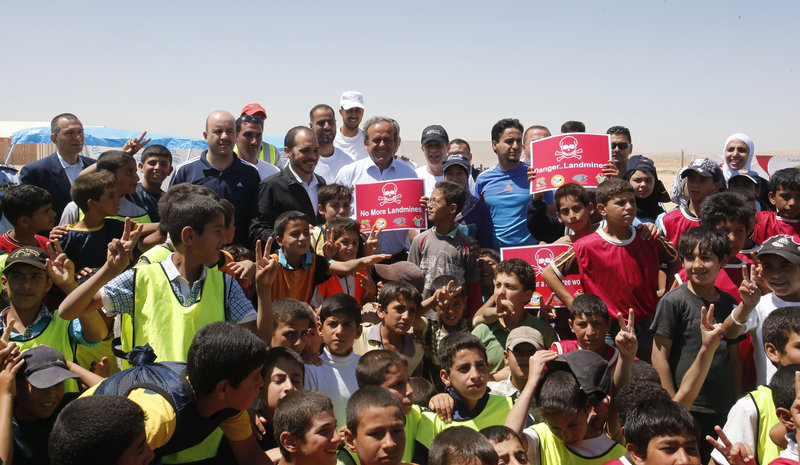By Andrew Warshaw
June 18 – Asian football, so often embroiled in negative politics, is doing its best to support thousands of Syrian refugees who have been streaming over the Jordanian border.
Last weekend, Uefa President Michel Platini was the latest high-profile figure to witness the work of the Asian Football Development Project as he accompanied his Fifa colleague Prince Ali Bin Al Hussein to the Zaatari refugee camp in an effort to gain a better understanding of the everyday challenges that face both the refugees and the Jordanian community affected by the crisis.
Prince Ali and Platini toured the football facilities and witnessed one of the Mine Risk Education (MRE) workshops which are supported by the AFDP, a non-profit youth commission founded and chaired by Prince Ali. The workshops aim to increase mine risk awareness amongst children through football activities, and decrease fatalities and injuries caused by mines and explosive remnants of war.
The AFDP and UEFA signed a Memorandum of Understanding in December 2012 which has seen European football’s governing body donate a number of footballs that are being used in development projects across Asia, as well as providing expertise and technical support.
“I am proud to witness how UEFA’s support to AFDP is helping youth in the refugee camp to overcome this difficult phase in their lives. Using football as a medium for social change continues to be our objective and we’ll work hard together to further strengthen our efforts,” Platini said.
Prince Ali added: “It is our responsibility to ensure that the kids believe in a better future, and what better way to inculcate a positive attitude amongst them than to use football’s transcendent abilities that can help create a favourable environment for the boys and girls.”.
The Zaatari campsite near Jordan’s northern border is currently the second largest refugee camp in the world with over 116,000 refugees forced to leave their homes in Syria in order to survive, 60 percent of whom are children below the age of 17 according to the UNHCR Senior Field Coordinator Kilian Tobias Kleinschmidt.
“We are now able to sustain water, food and shelter as the numbers are more stable but we are still facing some serious issues like keeping the youth under control and away from trouble, the youth here desperately need our attention,” Kleinschmidt stated at a media briefing.


